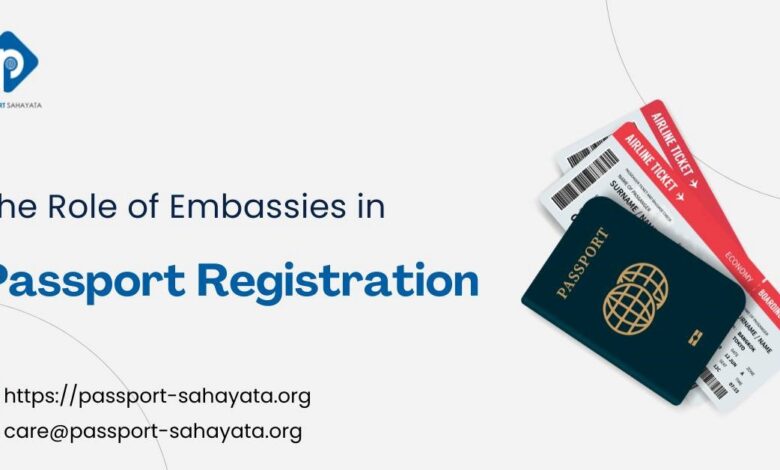The Role of Embassies in Passport Registration

Passport registration is the process by which individuals apply for, obtain, renew, or manage their passports. A passport is an official travel document issued by a government that certifies the identity and nationality of its holder, primarily for international travel. Apply for Online Passport ensures that citizens have valid and recognized travel documents that enable them to enter and leave countries, including their own. Embassies are crucial in facilitating passport registration for citizens living or traveling abroad. These diplomatic missions ensure that nationals can obtain, renew, and manage their passports efficiently, regardless of their location. This article explores the various functions embassies perform in passport registration, highlighting their importance in maintaining national security, assisting citizens, and fostering international relations.
1. Passport Application and Renewal:
Embassies serve as the primary point of contact for citizens needing to apply for or renew their passports while overseas. They provide the necessary forms, guidelines, and support for the application process. This service is particularly vital for expatriates, students, and long-term travelers who cannot return to their home country to complete these tasks. The embassy staff ensures all documents are correctly filled out and submitted, reducing the risk of application rejections due to errors.
2. Emergency Passport Services:
In cases of lost, stolen, or damaged passports, embassies offer emergency passport services. They issue temporary travel documents to ensure that citizens can return home or continue their travels without significant disruption. This service is crucial for maintaining the safety and mobility of citizens abroad. The temporary passports issued are usually valid for a limited time and purpose, primarily for return travel to the home country, where a full replacement can be processed.
3. Verification and Security:
Embassies are responsible for verifying the identity and nationality of applicants. This process involves rigorous checks to prevent identity theft, fraud, and misuse of travel documents. By ensuring the integrity of passport issuance, embassies help maintain national security and uphold the credibility of their country’s passports. Advanced security measures and biometric data are often used in the verification process to enhance security and authenticity.
4. Assistance with Supporting Documents:
Applicants often need to provide various supporting documents, such as birth certificates, proof of citizenship, and identification. Embassies guide applicants through the process of obtaining and submitting these documents, making the application process more manageable and efficient. They may also assist in obtaining certified translations of documents when necessary, ensuring that language barriers do not hinder the application process.
5. Consular Support:
Embassies provide consular support to citizens facing legal or bureaucratic challenges related to their passport applications. This support includes liaising with local authorities, providing legal advice, and assisting with translation services if needed. Consular officers are trained to handle a variety of issues, from simple document verification to complex legal problems, ensuring that citizens receive comprehensive assistance.
6. Education and Outreach:
Embassies often conduct outreach programs to educate citizens about the importance of maintaining a valid passport and staying informed about changes in passport regulations. They may offer seminars, informational brochures, and online resources to ensure citizens are well-prepared for travel. These educational efforts help citizens understand the steps involved in passport registration. And the importance of timely renewals, and the potential consequences of failing to maintain a valid passport.
7. Facilitating Travel for Specific Groups:
Embassies often have special provisions for certain groups such as minors, the elderly, and people with disabilities. They ensure that these individuals receive the necessary assistance and accommodations to complete their passport applications smoothly. This might include expedited processing for urgent medical needs or providing facilities for people with mobility issues.
8. Digital Services and Innovations:
With advancements in technology, many embassies have integrated digital services to streamline passport registration processes. Online application forms, appointment scheduling systems, and virtual consultations are becoming more common. Reducing the need for in-person visits and making the process more efficient. These innovations not only save time but also improve accessibility for citizens living in remote areas.
Also read: How to Renew Passport Online
Conclusion
Embassies are indispensable in the realm of passport registration, offering a lifeline to citizens abroad who need access to vital travel documents. Their role extends beyond mere administrative functions, encompassing security, emergency assistance, and consular support. By ensuring the smooth issuance and renewal of passports, embassies not only safeguard the mobility. And identity of their citizens but also strengthen international trust and cooperation. In an increasingly interconnected world, the efficient functioning of embassies in passport registration is more important than ever. And underscoring their significance in global diplomacy and national security.
The commitment of embassies to providing comprehensive, secure, and accessible passport services highlights their essential role in supporting citizens worldwide. As they continue to adapt to changing technologies and global challenges, embassies will remain a cornerstone of international travel. And security, ensuring that citizens can navigate the world with confidence and peace of mind.



